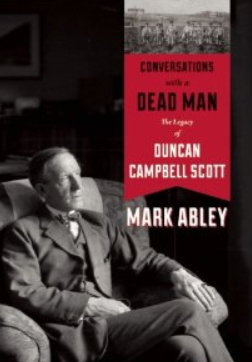Book Review: Duncan Campbell Scott: Poet and predator
How many conversations do we have with ghosts?
Those who have passed on have, no doubt, made good decisions, but what if the ghost we are talking made decisions that helped commit genocide? What if they made choices made that were absolutely contrary to advice from medical experts –advice that would have saved thousands of children from an early and terrible death? What about decisions that were made that only took into account a monetary bottom line and placed no value on human beings and their well-being? How would that conversation go?
Mark Abley has invited us into his imagination in his book “Conversations with a Dead Man” as he conjures up Duncan Campbell Scott — one of Canada’s most prominent poets of the Victorian era, and the architect of the residential school system and other programs that decimated First Nations people. Scott suddenly appears in the author’s living room, telling him “the failure of the body does not bring about the immediate death of consciousness” and tells Abley that news still reaches those who are only physically dead. He has heard he is on the list of the top worst Canadians — a development he says he cannot fathom, since he was a committed poet and civil servant. He wants Abley, as a writer and researcher, to tell him how this incorrect travesty could have possibly taken place and wants it corrected.
Abley uses these conversations to show unequivocal proof that the Dept. of Indian Affairs used inexcusably miserly financial arguments as a smokescreen for deeply racist prejudices based on Christian colonial notions of a moral and decent society — a practice that Scott had to know killed spirit, soul and community. Using well-researched facts from archives, studies and reports, Abley questions the death rates at residential schools, the intentional disregard, not only for children with tuberculosis, but the seemingly intentional way Dept of Indian Affairs assured its spread, the lack of any kind of warmth –physical or emotional, the extinguishing of language and culture, the unchecked access sexual predators had to children, the lack of standards for education, and the slave labour children were forced to provide so churches could make a profit off them.
The ghost of Campbell Scott shifts uncomfortably, avoids Abley’s questions and even tries sometimes to manipulate him. “I had to believe I was working for the public good” he answers at one point. This is a must read. Ironically it is through a dead man that the past is made so alive.
Conversations with a Dead Man: The Legacy of Duncan Campbell Scott; Mark Abley, Douglas & McIntyre, 2013, Madeira Park, B.C., 251 pg, $32.95–Reviewed by Laura Robinson



